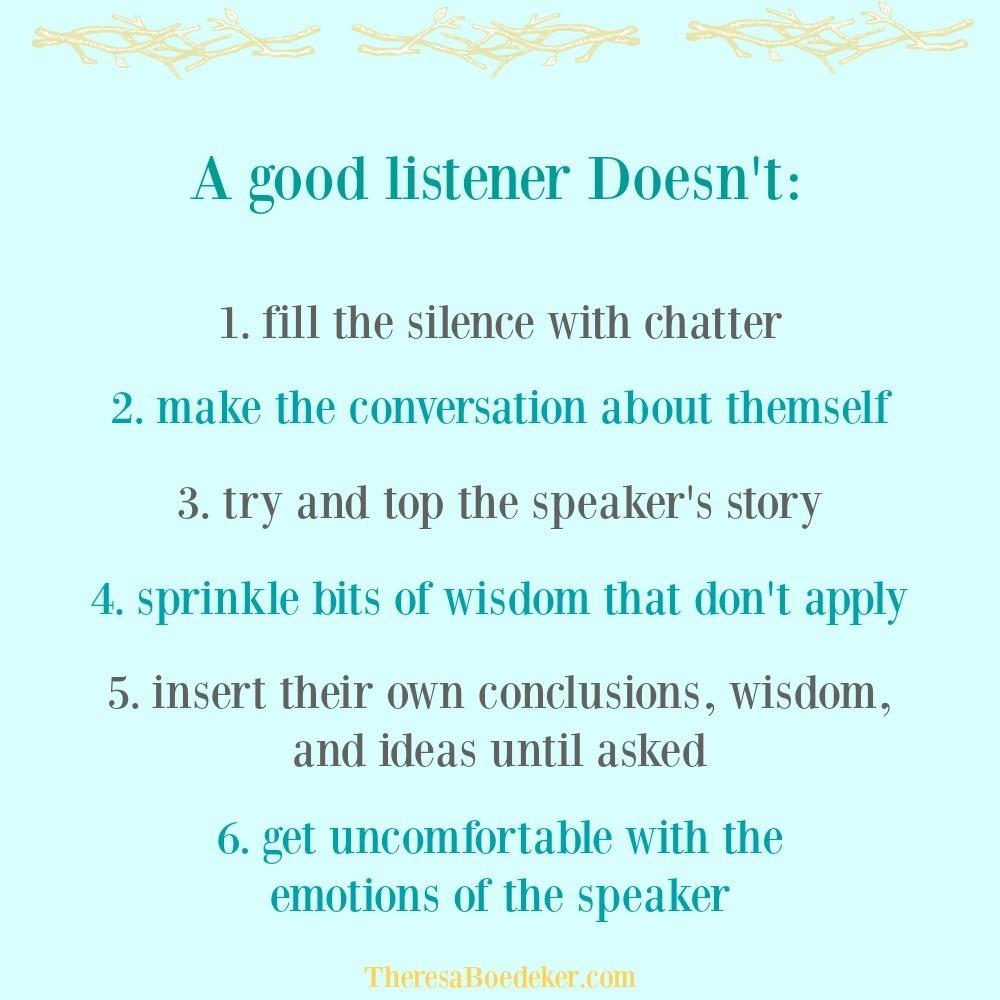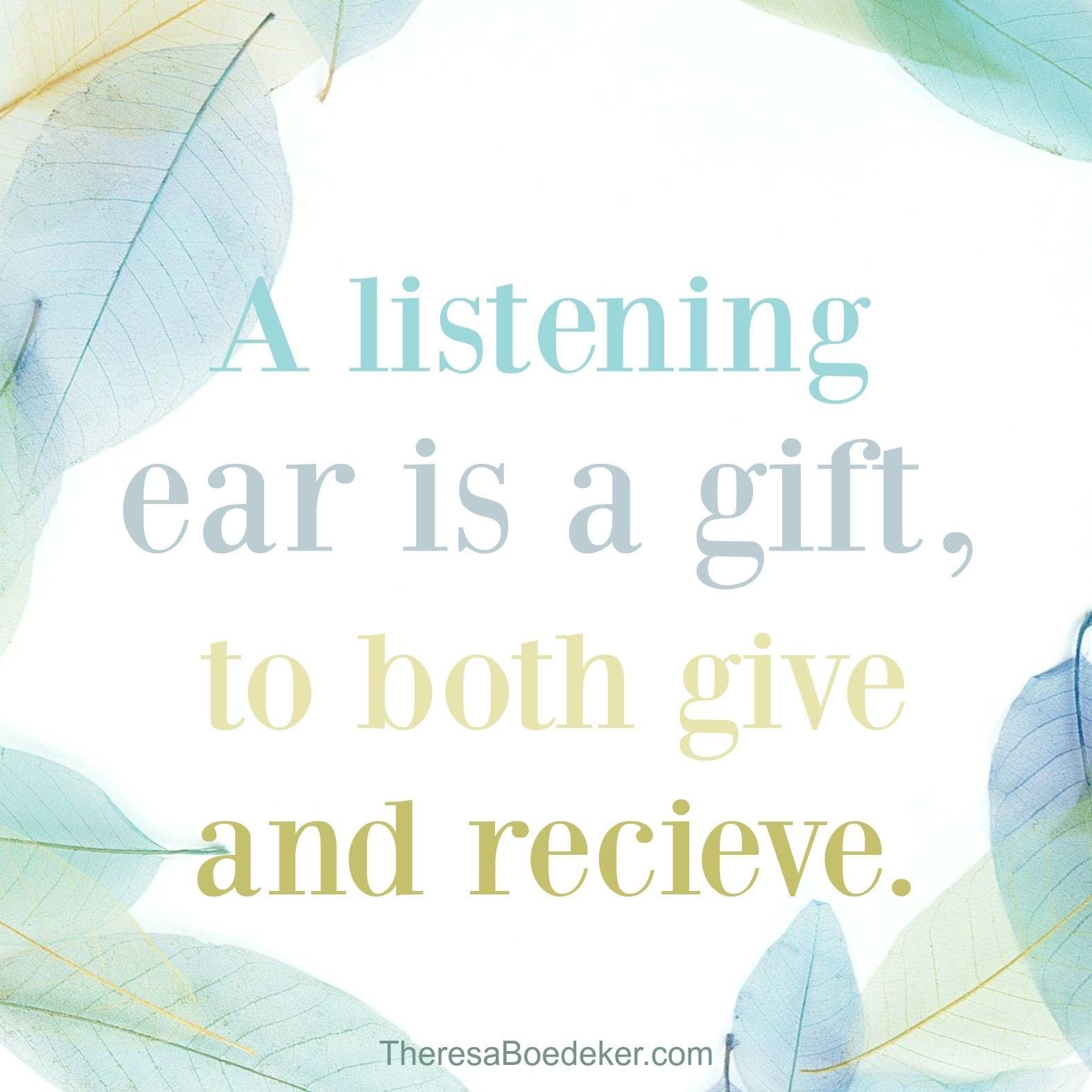We love to talk, but sometimes it is better to listen. Learn 6 qualities of a good listener and give the gift of listening to others.
I had a brother who talked practically non-stop. He must have enjoyed listening to his voice, because he most often talked aloud. During loud activities, such as a shower or mowing the lawn, he just talked louder. You always knew where to find him because all you had to do was follow his voice.
Many a night I fell asleep listening to the noise of his voice coming through our shared wall.
Around him, you listened. Occasionally nodding a head or murmuring. But he did most all the talking.
I had another brother who had a dry wit that taped you on the shoulder and then caused you to laugh aloud. He could tell funny stories and keep an audience in stitches.
But he also knew how to listen. And he could be silent.
If you had something to say, he would listen. And then he would pause and be quiet. And then he would ask a well-placed question? A question or two that helped you come to your own conclusion or solve your problem.
He didn’t often offer his opinion or advice, unless you specifically asked him. But you most often left the conversation with more insight than when you entered.
My two brothers were very different when it came to communication.
One listened to others. The other wanted to be listened to.
As I get older, I am trying to be more like the listener brother.

Qualities of a good listener.
Emily P. Freeman’s Podcast, The Next Right Thing, Episode 94: Ask the Second Question, describes how she was paired with another person for an exercise in clarity. One person was supposed to talk about something they were trying to gain insight on or decide something about, and the other person was only allowed to ask a question. The speaker would answer the question and talk some more. Whereupon the listener could only ask another question. And then another question.
The goal of this exercise was to provide clarity and insight to the talker.
As Emily is describing her experience, I can feel her pain. Or maybe it frustration. The hard task of being quiet. Not contributing to the conversation. Of being engaged enough to ask a well-formed question that helps the talker while offering no ideas of her own.
But then it came her time to talk. And Emily was surprised that with the help of a few questions, she had more insight and clarity by the end of talking. The exercise was more helpful than she imagined. For both of them.
This exercise reminded me of my brother with the dry wit, and the talent he had to listen to others and ask questions that most helped the talker.
I have come to realize that these conversations were never about him. He instead focused on the other person.
He didn’t fill the silences with chatter and in doing so redirect the conversation away from the original topic.
He didn’t try and top their story with his own. “I know exactly what you are saying because when I lost my job . . ..”
He didn’t use their words as a segue into his own story, “That reminds me of . . ..”
He didn’t impart generic wisdom on the subject to assuage his guilt for their suffering or to soften their pain, “All clouds have a silver lining.” “A blessing will come from this.”
He didn’t try and insert his own opinions and ideas, arguing why the person needed to do things his way.
He didn’t get uncomfortable in the speaker’s pain, grief, or distress and try to move them through the stages of grief in less than 3.2 minutes. Nor did he try and return them to joy before the end of the conversation.
He knew that problems are not often easily solved. Grief and sorrows need time to process and be slowly worked through. And that emotions circling heavy times cannot be worked out and neatly tied together through a quick conversation.

Why we need a listening ear.
To process life, our emotions, make sense of things, come to conclusions or a new direction, we often need time. Time to think and process. And time to think aloud and just listen to our words pouring through our mouth so we can make sense of it all.
A well asked question can help us explore our topic. Pivot us in a new direction. See a new perspective.
Hearing our words bounce through the air and be received by a non-judgmental listener, is one of the best gifts we can receive.
It is also one of the best gifts we can give to others.
Sometimes we need this gift as much as we need our next breath of pure air. And those around us need it too.
The goal is to let them talk through and process their emotions, clarify their timeline of events, walk through thoughts, try on ideas, and discuss the rawness of life.
Imagine how different our conversations would be if we provided this to others?

Imagine how our listening ears could help others.
If we listened more and asked a few good questions, conversations could change.
What if when our child complained about getting a bad grade; instead of asking them how long they studied and then launching into the usual speech on the importance of grades, we asked them why they thought they received a low grade? What if we asked a question or two that helped them determine the cause of their bad grade? What if we allowed them to talk a lot more than we lectured? What if we asked a few pointed questions and they came to their own conclusions: that they needed to study more, take notes, or . . ., instead of us diagnosing their problem, controlling the situation, or outlining the solution for them.
Maybe they would go away feeling heard and ready to put forth the effort to fix their problem.
What if when our mate came home and complained about having a bad day; we asked them what made their day so bad? What if we listened, instead of jumping in with our version of our bad day and started the competition of whose day was worst? What if we listened to their bad day story, instead of trying to top it with our story? What if we asked a question, and then asked how this made them feel? Or asked how we could help? Or if they needed anything from us?
My guess is they would feel heard, less stressed, and be more ready to listen to the story of our day.
What if our friend, who was walking through grief, had our listening ear more than our talking tongue? What if we held our small bits of wisdom that really help no one adrift in hurt, and instead asked them to tell us more. What if we bit the urge to tell them we knew exactly what they are going through and asked them what the hardest thing about their grief is? What if we quit trying to top their story with our own time of grief and just acknowledged their loss and grief. Told them we were sorry for them. Asked them how they were really doing. What was their mind going back to again and again? What emotions were swallowing them alive? What thoughts were drowning them?
What if we really listened and only asked another question that tied into what they had told us? Never changing the topic until they were ready to move on. What if we kept their confidence and guarded it like the treasure it was? What if we truly loved them and left judgement, opinions, and solutions at the door?
Wouldn’t we be more vulnerable, and as a result, more healed?

Thanks for stopping by. Keep remembering what’s important.
Theresa
Join the Discussion: How has a listening ear helped you?

May link up at Kelly Balarie (#purposeful faitht), Crystal Storms (#HeartEncouragement), Maree Dee (#Grace & Truth), Anita Ojeda (#inspirememonday), and Mary Geison (#tellhisstory).
- How Knowing Your Husband Can Impact Him for Good - March 24, 2022
- How to Stop Focusing on What’s Wrong with You - March 9, 2022
- Is God Really Good All the Time? - February 24, 2022
I know I tend to jump to solving the person’s problem, #5, before listening. I know I don’t like people doing this to me. So this is something I am working on. It’s like when I say,” I am so tired.” and the person jumps in and says, “Go to bed earlier.”
Wow, Great Blog!! Boy do I need to work on being a better listener. Thanks for all the great tips. I printed them out and am going to post them where I will see them so I can work on them more.
You are always a joy to read.
Thanks Bliss. You are a treasure.
Thank you for these good suggestions on listening. Although I (obviously) didn’t know him, I am trying to be more like your listener brother too. Listening well requires a focus on something other than “self”, humility, and empathy, all wonderful characteristics. The world would be a much better place if we all spent more time listening. Loved this post!
Yes, Laurie. Really listening is hard work. It requires me to do as my dad used to say, “Not already be listening.” Which meant thinking about what I wanted to talk about and how I could respond to the person. It’s a phrase we use in our house now, to remind others to really listen to what we are saying.
Theresa, hi! What a powerful post. What a gift to have even just a soul or two that will listen well, carefully, completely without any kind of agenda.
It was good to run into you again today. I’ll be sharing your wise words with the people in my world. Bless you …
Hi Linda. Yes, it is a blessing to be listened to. And a blessing we can pass onto others. Listening without any agenda, that is the hard part, and one I am working on. Good to hear from you again. Blessings on your week.
This was a great post! Although my role in life seems to be one of being mainly the listener, I’m not so sure I have asked well-directed questions to my storytellers. I’m going to work on that.
Hi Jerralea! I am working on asking the well-directed questions too.
I love the name of that episode: Ask the second question. I’ll have to go look it up. I tend to be more of a listener than talker just by nature but I still need to learn to listen WELL, and not just give the appearance of listening simply because I’m quiet. 🙂
Thanks for visiting, Lisa. Yes, it is easy to give the appearance of listening, at least for me, when I am not listening as well as I could be.
I like Emily’s podcast because they make me think. They are also often under 15 minutes, so easy to listen to when I want a short listen.
I know it really is a gift to be a good listener. I try but I know I can improve. I especially struggle with #6. Even if I’m not talking, I tend to hurry or shut down a conversation if it becomes emotional. Good encouragement in this post today. Thanks for sharing food for thought:)
Hi Jennifer! Yes, listening when the conversation becomes emotional can be hard. I think sometimes I rush to help the person into a good mood, not realizing that the person needs to process emotions first.
Such meaningful insight here, Theresa. Thank you. I noticed you wrote twice that you “had” a brother. Did you lose two brothers? If so, I’m so very sorry. Love and blessings to you!
Yes, Trudy. I lost one brother last year, and the other one 6 years ago. Love and blessings to you!
I’m so very sorry, Theresa. That must be so difficult. May God give you His special grace and strength for each day! Hugs!
Thank you Trudy. That means a lot. Like your recent post says, we don’t always know why, but we can know that God is beside us each step of the way.
Such truth here! I WANT to be a good listener, but all too often I get in the way. Thank you for the tips and reminders to listen and keep my mouth closed!
Glad I could remind you and myself at the same time.